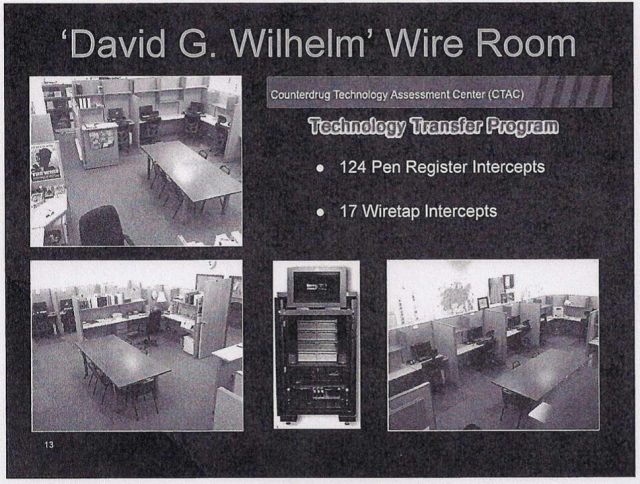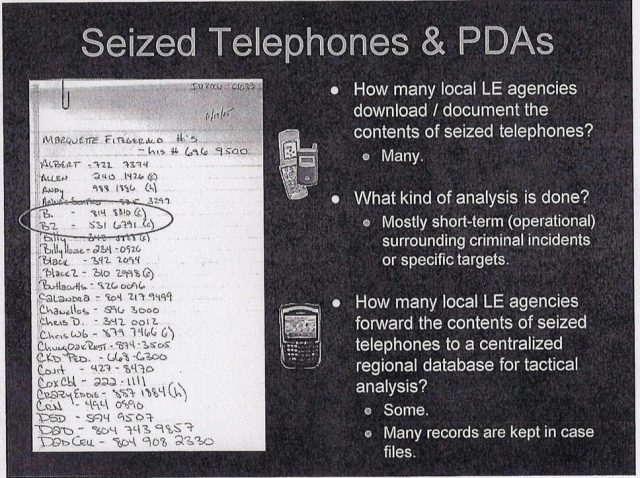How To Get A Pen Register At Your Police Agency Ohio
Policy —
Feds proposed the hole-and-corner telephone database used past local Virginia cops
New docs: Prosecutors offered one-end shop for seized phone data in Virginia.

A Virginia-based law enforcement information sharing ring, which allows signatory police agencies to share and analyze seized "telephone intelligence information," was first proposed by federal prosecutors, according to new documents obtained by Ars. Federal involvement suggests that there could be more such databases in other parts of the country.
"Information technology's unsurprising to see the feds encouraging local constabulary enforcement agencies to create these localized databases," Hanni Fakhoury, a staff chaser with the Electronic Frontier Foundation, told Ars. "In fact, there's a whole division within the Department of Justice that focuses on educating and advancing local law enforcement interests, the National Institute of Justice. And so I would imagine at that place are others."
Equally Ars reported last calendar month, according to a memorandum of understanding (MOU) outset published by the Center for Investigative Reporting, the police departments from Hampton, Newport News, Norfolk, Chesapeake, and Suffolk all participate in something chosen the "Hampton Roads Phone Assay Sharing Network," or HRTASN.
The database compiles both content copied from phones and metadata gleaned from telephone usage—some obtained nether the authorisation of a warrant, some via a court order, and some via a mere subpoena. Some state legal experts have questioned whether such an umbrella database is legal under Virginia law. Rob Poggenklass, a staff chaser at the American Civil Liberties Union of Virginia, told Ars that he believes the database is in violation of Virginia's Regime Data Collection and Broadcasting Practices Deed.
A document that Ars recently obtained under a public records request from the City of Norfolk shows that an analyst from the United states Attorney's Office in the Eastern District of Virginia was, in fact, the creator of HRTASN. That certificate, which appears to date from 2011, is called "A Proposal for Creation of the Hampton Roads Telephone Intercept Sharing Network."
The thirteen-page presentation was authored by Paul Swartz, an investigative annotator. His LinkedIn contour indicates that, prior to joining the federal government, Swartz worked for over 20 years at the Newport News Police Department, retiring at the rank of sergeant. Swartz initially did not return Ars' requests for comment, but then referred Ars to Joshua Stueve, a US Chaser'due south Part spokesman, who also did not respond to requests for comment.
Welcome to the "Wire Room"
The document explains just how revelatory information obtained almost and from a mobile phone can be. Non surprisingly, law enforcement can identify "family members," "legitimate concern associates," and "criminal associates" by looking at phone records. By using "cell-site monitoring," better known as a stingray, law enforcement tin too glean "methods of performance."
The proposal also indicates that pen registers, which can record phone numbers dialed and received and are easily obtained through a court order, may non be quite as pervasive as some critics have feared—due to expense.
Getting a estimate to sign off on a pen annals is a far lower standard than beingness forced to show likely cause for a search warrant or wiretap order. Such a wiretap guild requires police force enforcement to not only specifically describe the alleged crimes simply also to demonstrate that all other ways of investigation had been exhausted or would fail if they were attempted.
In the pre-cellphone era, a "pen register, trap and trace guild," which is granted by a judge, allowed police force enforcement to obtain someone's calling metadata in nigh real-time. At present, that same data can too be gathered straight by the cops themselves through the use of a cell-site simulator, also known as a stingray. Stingrays, even so, also tin can be used to intercept calls and text messages—and the device doesn't just piece of work against one target phone but also against other phones that may happen to be nearby.
The document seems to advise that the Newport News Police force Section—which operates in a city of 180,000 people—had only conducted 77 pen registers at the fourth dimension that the document was written. Meanwhile, the Peninsula Narcotics Enforcement Task Force had undertaken 29, while the Virginia Beach Police Section had done but half-dozen.
"More often than not deferred to federal agencies," the document notes, citing the FBI, Drug Enforcement Agency, and Immigration and Customs Enforcement as agencies improve equipped to handle such techniques.
So why don't more than cities try to use pen registers in law operations? Local cops apparently aren't trained in how to gather, store, and analyze such information. Plus, getting that data isn't cheap; mobile telephone companies charge anywhere from $1,500 to $iii,000 for sixty days of access.
The slide deck as well shows a flick of the federally run "David G. Wilhelm Wire Room"—which, amazingly plenty, sports a poster of the hitting HBO Tv show The Wire. Wilhelm was an Atlanta-based Immigration and Customs Enforcement (Water ice) Assistant Special Agent in Charge (ASAC) who was killed in the line of duty in 2005. A diagram seems to suggest that the "wire room" is the heart of the unabridged functioning.

"The goal is to try to avoid costs or at least bring downwards costs by letting more law enforcement agencies access the data from 1 pen register," Jesselyn Radack, a well-known national security attorney and former ethics adviser to the United States Department of Justice, told Ars afterward reviewing the presentation. (She is also currently one of the attorneys representing whistleblower Edward Snowden.)
The documents exercise not fully explicate what is existence done, but they seem to suggest that each time a pen annals guild is granted or telephone data is seized, this information is compiled into a larger database for later querying.
"I would imagine they would however need pen register authority to actually query the database and get the records, but possibly this tech enables them to go the records themselves rather than go to the provider every time?" Fakhoury added. "I'g not really certain. Plus I recollect pooling all the data for analysis and mining probably reduces the demand to get pen register orders every bit the investigation continues."
"The bigger problem is the lack of oversight"
Radack as well noted that there was another larger problem hither.
"What jumps out nigh though is the surveillance pitter-patter it reflects—the idea that all intelligence and law enforcement agencies need access to the biggest possible haystack—an idea that has non proven successful given the originator of the 'big haystack' mentality [the National Security Bureau] has been unable to properly assemble intelligence from the data, and in fact misses actionable intelligence," she added. "The goal here seems to be to become local law enforcement agencies to do more than digital surveillance or at least be able to get a piece from the databases."
However, some of the tactics outlined in the presentation may no longer be legal equally per the unanimous California v. Riley Supreme Court conclusion from before this year, which constitute that police enforcement cannot search a mobile phone without a warrant.
Specifically, the certificate asks: "How many local [law enforcement] agencies download/document the contents of seized phones? Many."

"There are certainly privacy implications at giving more agencies access to the information," Radack concluded.
"The bigger problem is the lack of oversight. A court authorizes a pen annals for one target in one investigation and then that information is moved to a database for who knows what future investigation or what futurity target or suspected target. It's not clear who—if anyone—is making sure stored info is used legitimately."
Source: https://arstechnica.com/tech-policy/2014/11/feds-proposed-the-secret-phone-database-used-by-local-virginia-cops/
Posted by: longwiself.blogspot.com


0 Response to "How To Get A Pen Register At Your Police Agency Ohio"
Post a Comment